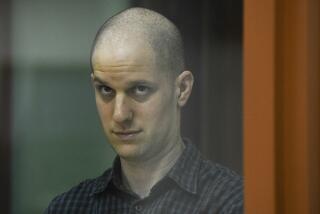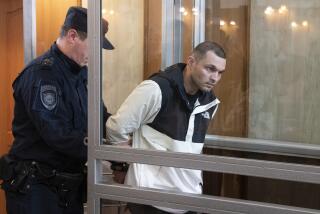Russians Allow Accused Spy to Visit Home
- Share via
SAN DIEGO — Accused spy Richard Bliss flew home to be reunited here with his family Christmas evening, insisting he was innocent but promising to return to Russia to face prosecution if so ordered.
After a 19-hour flight from Moscow that put an end to his ordeal--at least for now--the Qualcomm Inc. field technician was greeted at San Diego’s Lindbergh Field airport by his parents, fellow employees and local politicians.
He told reporters at a brief press conference in a private jet hangar that although he hopes charges will be dropped, he will keep his promise to return on Jan. 10 to Rostov-on-Don, a city 600 miles south of Moscow, to face charges if the investigation continues.
“My word is my bond,” said Bliss, 29. He added, “Obviously I’m very relieved to have been released from Russia.”
Qualcomm executives are hopeful that his return won’t be necessary and that the Russian Federal Security Service--the main successor to the KGB--will drop the spying charges brought against Bliss after he was detained Nov. 28.
In denying the charges, Qualcomm has said Bliss was merely doing his job in helping to install a wireless telephone system in Rostov that the local telephone utility had ordered.
Bliss was using a hand-held Global Positioning System device to verify the Qualcomm system’s coordinates and signal strength. The Russians accused him of illegally importing the device and using it to identify military installations.
President Clinton, Vice President Al Gore and U.S. Secretary of State Madeleine Albright made calls to Russian officials to protest Bliss’ arrest.
The political pressure persuaded the Russians to allow Bliss to come home for two weeks, under an agreement between San Diego-based Qualcomm and the Federal Security Service.
It also appeared that Russian officials might be softening their stance on a demand that Bliss return next month to face spying charges. But the Interfax news agency reported Thursday that the term of Bliss’ stay in the United States had not been defined.
Bliss’ return was delayed when ice-covered runways closed the Rostov-on-Don airport Tuesday and prevented a Qualcomm-chartered jet from landing to pick him up.
Qualcomm then scrambled to get Bliss aboard commercial flights. He was flown to Moscow, where he waited about a day for the first flight out--an Air France jet to Paris. There, he boarded the first plane bound for Los Angeles. Qualcomm then chartered a flight to San Diego.
Bliss could be summoned back to Russia at any moment, Federal Security Service spokesman Maj. Gen. Alexander Zdanovich told Interfax. But Bliss’ Russian lawyer, Valery Petryayev, said the release was an admission of the weakness of the government’s case.
“Of course, had he been a real spy, nobody would have sent him to America for Christmas,” Petryayev told Russian television.
Business sources in Moscow said Russian authorities had reportedly pressured Qualcomm’s local office for kickbacks, and there was speculation that Bliss’ arrest was an attempt to squeeze money from the company.
Qualcomm chief executive Irwin Jacobs said that Russian officials initially indicated that Bliss would have to pay $5 million bail to leave, but later dropped the demand. Bliss posted no bail.
Bliss, a San Diego native, had been working for Qualcomm for six months. He had spent two months as a field technician in Russia when his ordeal began.
Also returning with Bliss was fellow employee Robert Holt. Both were detained for questioning and their equipment confiscated Nov. 25.
Bliss was arrested, jailed for 12 days and charged with espionage. The system he was using works by communicating with an umbrella of satellites orbiting Earth. The receiver unit picks a satellite signal and, when three satellites link up with the Global Positioning System, the user can record precise latitude and longitude.
Bliss’ use of the land survey equipment was part of an effort to locate receiving and transmitting stations for installation of a Russian cellular system.
Systems similar to the one Bliss was using can be found in this country in stores such as Sharper Image and Radio Shack, and Qualcomm President Harvey White said they can be also found on retail store shelves in Moscow.
But under Russian law, survey measurements accurate to within 30 yards are considered a state secret, security officials say.
The Federal Security Service said the equipment was brought into the country illegally, but Qualcomm and U.S. government officials say the purposes of the devices were clearly outlined, in import documents accompanying Qualcomm hardware, as meant only for telecommunications installation. Bliss has acknowledged making land surveys, but said he is innocent of espionage.
A Federal Security Service officer told a Russian news service that, in an interview, Bliss had admitted “the illegal import of satellite equipment into Russia, measurements with the aid of its coordinates without appropriate transmission and partial transmission of received information to the city of San Diego.”
More to Read
Sign up for Essential California
The most important California stories and recommendations in your inbox every morning.
You may occasionally receive promotional content from the Los Angeles Times.













